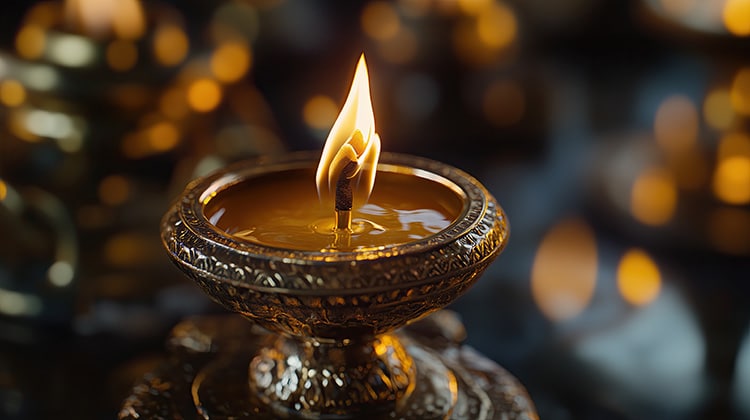What is Virya or Exertion in Buddhism?
Category: Buddhist Meditation | Buddhist Path

Why is Virya Necessary?
Meditation is fairly straightforward, but it’s not easy. It requires us to apply consistent, continued effort before our meditation practice becomes imbued with ease. If our idea of effort, however, is perfumed by strife, struggle, or exhaustion, why would we ever want to meditate? Virya, the attitude of joyful effort, is what allows us to approach our practice with beneficial energy, joy and enthusiasm.
Virya is a Sanskrit word that can be defined as energy, effort, diligence, or persistence. It shares a root with English words such as vigor and virile. In the Buddhist context, virya energy is not merely about perseverance, but the quality of joy that accompanies our steadfastness. In fact in some texts virya is translated as “joyful perseverance”.
Virya is a special type of spiritual effort that is imbued with wisdom and joy. When we’re engaged with virya, we happily take part in meritorious activities for we trust this will bring us closer to awakening. This particular flavor of joyful effort keeps us enthusiastically engaged at every step along the Buddhist path.
The Significance Of Joyful Effort
Virya is among the 6 paramitas, the transcendental actions of both bodhisattvas in training and enlightened beings. In the Mahayana tradition, the 6 paramitas include generosity, morality, patience, joyful effort, meditation and wisdom.
In the context of this interconnected list, we can see how cultivating joyful effort is foundational to our ability to overcome our stinginess, harmful habits, and impatience. Virya is also necessary to progress in our meditation practice, the foundation of wisdom.
Along the Buddhist eightfold path, virya is connected with Right Effort. When engaged in wise effort, we actively address the two main obstacles to our growth, agitation and dullness. Virya helps us in our effort to overcome laziness, and keeps us grounded in positivity when agitation arises.
Making A Joyful Effort
Joyous effort and diligence motivate us to meditate, help strengthen our practice, and give us the energy we need to integrate our practice into our daily lives.
The effort of beginning: Virya may also be translated as hero. In yoga, for example, virasana is the hero’s pose. Thus, virya is related to courage and found in those who have the confidence to change. Any of us who have courageously chosen to break free from habitual cycles, to turn toward meditation or a spiritual path, are heroes in our own right. We have made the valiant decision to free ourselves and others.
The effort of sustaining: Rejoicing in the heroic effort it took to begin can help us sustain this resolute energy as we practice. While meditating, we might practice a subtle inner smile or lift up our chest a bit with pride, knowing that we are taking part in a beneficial activity.
The effort of completion: As we proceed along the path and start realizing the benefits of our practice, virya is strengthened by way of a positive feedback loop. Effort results in joy, which makes applying effort more joyful. We become indefatigable.
How To Cultivate Virya
If you’re feeling low on energy or uninspired to practice, it may be time to cultivate virya. This can be done in several ways. Laziness is traditionally overcome via one of two primary methods, recalling our leisure and fortune, or meditating on the inevitability of our death.
- Meditating on leisure and fortune entails bringing awareness to the preciousness of our human birth, our inclination to practice, and the resources we have at our disposal. Recognizing the precious opportunity we have to become free helps us stoke urgency.
- Mindfulness of death can energize our practice by bringing attention to the fact that we will die someday and we have no idea when – the powerful message of impermanence. The only thing that will be of use to us in that sacred moment will be the strength of our spiritual practice.
Sometimes, cultivating energy simply means no longer wasting it. Once we get clear about what’s most meaningful for us in this life, we can stop leaking energy. Letting go of attachments and resentments is one way to conserve. Time spent in silence is also a beneficial means of preserving energy.
We can overcome dullness in daily life by bringing more awareness to old habits. Where in our life do we do things begrudgingly? Notice if you feel annoyed when it’s your turn to do the dishes, when you’re asked to help a neighbor, or when a co-worker wants advice. Everyday life provides us ample opportunity to practice directing our energy toward right action, and doing so joyfully.
Each time we choose to take initiative, especially when it comes to our spiritual practice, we are engaging in the cultivation of virya. So, each time you choose to meditate, to register for a dharma class, or to apply the principles of the teachings in everyday life, take note! Bring awareness to the energy you’ve applied to healing yourself and the world around you, and celebrate how good it feels to do it.








